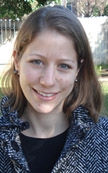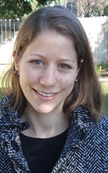- Author: Kathy Keatley Garvey

This major agricultural pest is one of the causes of those cat-faced strawberries you see in your garden or in the field. Cat-faced? Think misshapened, deformed or irregularly shaped berries.
Catfacing occurs when the young seeds (achenes) fail to stimulate the fruit (receptacle) to grow.
Lygus bugs attack herbs, vegetable crops, commercial flower plants, fruit trees and nursery stock.
Enter Frances Sivakoff, doctoral candidate in entomology at UC Davis. She'll discuss her research on lygus bugs from 12:10 to 1 p.m., Wednesday, Oct. 19 in 122 Briggs Hall, UC Davis.
Her topic: "Pest Management from a Landscape Perspective: Understanding the Factors that Influence the Distribution of Lygus hesperus.”
Sivakoff, who studies with major professor Jay Rosenheim, investigated the dispersal ability of lygus bugs. Her results support the “already established importance of safflower, alfalfa, cotton and uncultivated agricultural land on Lygus population dynamics."“
Her research also "demonstrated the importance of several other crops in California’s San Joaquin Valley that have not traditionally been considered for the management of Lygus."
Entomology professor James R. Carey plans to webcast the seminar and then post it online on UCTV.
So soon, coming to a computer near you, lygus bug research!

- Author: Kathy Keatley Garvey

Sivakoff (right), a doctoral candidate in the UC Davis Department of Entomology, won a 2010 Robert and Peggy van den Bosch Memorial Scholarship for her work on the regional movement of the pest.
The lygus bug (Lygus hesperus) is a serious pest of such crops as alfalfa, strawberries and cotton.
Her research? "Understanding the Relative Dispersal Ability of Lygus hesperus and Its Predators Using a Novel Large-Scale Mark-Capture Technique."
“In California’s Central Valley, Lygus hesperus is under poor biological control despite a suite of known predators,” said Sivakoff, who studies with major professor Jay Rosenheim. “One possible explanation for this poor performance in the field is a discrepancy in the dispersal ability of the pest and its predators. To examine this directly, we performed a large-scale mark-capture experiment where we marked L. hesperus and its predators in an alfalfa field using protein markers.”
Following the marking procedure, the grower harvested the alfalfa field, and this prompted a dispersal event. At several times following the harvest, Sivakoff and colleagues sampled surrounding cotton fields for L. hesperus and its predators, including big-eyed bugs (Geocoris spp.), damsel bugs (Nabis spp.), green lacewings (Chrysopa and Chrysoperla spp.), and convergent lady beetles (Hippodamia convergens).

His project: “Investigating Host-associated Lineage Splitting within Dactylopius Using Molecular Phylogenetics.”
Van Dam studies with major professor Bernie May of the UC Davis Department of Animal Science.
Sivakoff and Van Dam were among eight University of California doctoral candidates sharing a total of $95,000 as recipients of the scholarships.
The recipients are all involved in biological control, said coordinators Kent Daane and Nicholas Mills, co-directors of the Center for Biological Control, UC Berkeley. Eligible to apply for the annual scholarships are doctoral candidates from UC Davis, UC Berkeley and UC Riverside. Selection is by a panel of biocontrol faculty representing the three schools.
The other recipients of 2010 van den Bosch scholarships:
Albie Miles, UC Berkeley, for "Evaluating the Influence of Floral Resource Provisioning on Biological Control of Leafhoppers and Mealybugs in California Vineyards." Major professor: Miguel Altieri.
Steve Bayes, UC Berkeley, for "Determining the Population Structure of Navel Orangeworm (Amyelois transitella): an Invasive Agricultural Pest in California." Major professor: Steve Welter.
Jason Mottern, UC Riverside, for his work on molecular relationships within the parasitic wasp family, Aphelinidae. Major professor: John Heraty.
Jamie Gonzalez, UC Riverside, "Genetic Effects of Prolonged Mass Rearing on Trichogramma pretiosum Fitness: Inbreeding Depression and Selection for Adaptation the Mass Rearing Conditions." Major professor: Richard Stouthamer.
Casey D. Butler, UC Riverside, "Assessment of the Potential for Biological Control for Management of Bactericera cockerelli (Hemiptera: Triozidae)." Major professor: John Trumble.
Jennifer Henke, UC Riverside, for his work dealing with t secondary impacts on fish. Major professor: William Walton.
Congratulations to them all!




